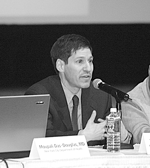With Albany HIV proposal circulating, health commissioner criticized at town hall forum
“We have some very strong concerns about this bill,” said Lisa Winters, executive director of the Bronx Consortium, a queer community center. “It seems that this bill embodies some very extreme provisions.”
Winters was one of three people from Bronx AIDS and gay groups who joined Frieden on a panel at the March 22 event prior to taking audience comments and questions. While earlier discussions of the Frieden proposals were limited because the city health department had not yet produced the proposed changes, the Bronx forum was informed by draft legislation that began circulating in Albany on March 20. A number of AIDS advocates said that they appeared to be far more sweeping than what Frieden had earlier described in meetings and press interviews.
“It seems like what the commissioner has been talking about doesn’t really relate to the legislation,” said S.J. Avery, chief executive of Bronx AIDS Services. “It’s a lot more encompassing.”
The changes would allow his department to use the results of T cell count tests, a measure of the state of the immune system, and viral load tests, a measure of the amount of HIV in a person’s blood, to monitor their treatment. When the city health department sees a falling T cell count and a rising viral load it could contact the patient or the patient’s doctor to offer assistance.
Those test results are already reported to the state and city health departments, but state law allows them to be used only in sex or needle-sharing contact tracing efforts or epidemiological studies. This restriction applies to all of the HIV-related test results that are currently reported to the city and state health departments. The proposed law would lift that restriction on all those tests.
But the legislation would also require some Medicaid-funded programs, called COBRA case management, the city’s HIV/ AIDS Services Administration (HASA), some special needs programs that serve people with AIDS, and the AIDS Drug Assistance Program (ADAP) to “provide additional information concerning” a person with HIV when those agencies or programs were the most recent service provider for that person.
Those programs and agencies tend to serve the poorest and sickest New Yorkers with HIV. One audience member said of the proposal, “Your tracking will further stigmatize poor black and brown people. This is really scary.”
Some audience members expressed the concern that AIDS groups had spent years building trust with their clients and the proposal would destroy that. Frieden disputed that. “The intent of the legislation is not to get community-based organizations to rat on people,” he said.
The proposal on ending written consent for HIV testing also drew fire. The legislation requires informed consent before HIV testing and the fact that the consent was given must be documented in the patient’s medical records. The legislation, however, states, “In order for there to be informed consent, the person ordering the test shall at a minimum advise the protected individual that an HIV test is being performed.” Some advocates suspect that this would allow an HIV test to be done if a doctor informs a patient he will test him or her and the patient does not respond at all.
“Merely informing a person that they will get an HIV test should not be sufficient for consent,” Winters said.
There were several angry denunciations of Frieden and his proposals as well as charges that the Bronx is shortchanged on AIDS dollars. One audience member called Frieden a “Nazi” while others yelled out, “He’s lying” when the commissioner responded to an audience question or comment.
The commissioner did win some support during the two-hour event.
Paloma Izquierdo-Hernandez, a panelist and president of the Urban Health Plan, a Bronx AIDS group, commended “the health department for putting these things forward.” She also said that lifting restrictions would allow the health department to share data if that patient should become a client of her agency.
“As a primary care provider, I can’t tell you how invaluable that is,” Izquierdo-Hernandez said.
Levern Jackson, a panelist and a nurse practitioner at the North Bronx Healthcare Network, endorsed “streamlining HIV testing.”
“Every year the statistics rise,” Jackson said. “We are not doing this right… HIV testing should be offered to everyone.”
gaycitynews.com



































